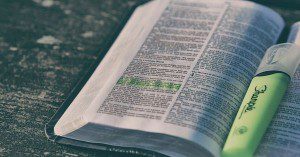 It might not be our image today, but it was the psalmist’s image: “I am like a wineskin in the smoke” (119:83). Or as the JPS translator has it: “Though I have become like a water-skin dried in smoke.” What does this image evoke, for it is from this point that this section (kaf, or K) of Psalm 119 takes its departure?
It might not be our image today, but it was the psalmist’s image: “I am like a wineskin in the smoke” (119:83). Or as the JPS translator has it: “Though I have become like a water-skin dried in smoke.” What does this image evoke, for it is from this point that this section (kaf, or K) of Psalm 119 takes its departure?
Dried up to the point of cracking.
Hard to the point of no flexibility.
Parched to the point where moisture is the only hope.
What makes you dry up? What hardens you? What parches you? Do you know what it is that leads you into such a condition? But this psalmist is beyond simply recognizing his personal condition and clear needs — in spite of being dried up and parched, “I have not neglected your laws.”
My favorite commentary on all things Psalms? John Goldingay, Psalm 101-150
Two observations:
Sometimes our personal condition absorbs us; we can think of nothing but ourselves; we become self-preoccupied to the point of obsession. We need self-awareness; self-absorption we don’t. In spite of our needy condition, the psalmist reminds us that even when we are parched to the point of cracking, we are to have a wineskin hope — the hope of a wineskin parched and drying but still pining away for some moisture, and that moisture comes from the Water who is God.
The psalmist is parched and his only hope is moisture if the skin is to survive. How does he cope? What can he do? Notice these words:
He longs for God to deliver (119:81a).
He hopes in God’s Word (119:81b).
He does not abandon God’s precepts (119:87b).
He petitions God to preserve him (119:88a).
The image the psalmist uses, the drying, parching wineskin, impresses me: it is so evocative of sterility and frigidity and apathy and depression and hopelessness. In spite of his condition, the psalmist has the hope of a wineskin — which (of course) has no real hope, but it can signify (by metaphor) a condition of serious need. He longs for God’s deliverance. One thing strikes me about the Bible: living by faith occurs when there is a challenge beyond our capacities, living by hope occurs when we are hopeless. It is easy to talk about faith and hope; it is hard to live by faith and to live in hope. The psalmist points the way.
The psalmist depicts himself like a parched wineskin being dried out in a smoker. What are his problems? People. Notice these:
He lacks comfort (119:82b).
He wonders how many days he has to live (119:84a).
He is persecuted (119:84b).
The insolent are digging pits (for his burial) (119:85a).
The persecutions are without cause (119:86b).
They tried to wipe him from the earth (119:87a).
Put succinctly — his opponents are trying to kill him. Now we don’t live in a world much like this (at least most of us don’t). But, the world of this psalmist wasn’t tolerant and pluralist: the way to deal with dissent was to put people away — exile them or assassinate them. He feels the threat of death over his shoulder and behind his back, and it wasting him away. And in the middle of these problems, the psalmist pauses to record his reflections and points himself toward God in prayer.
I don’t know much about wineskins, but I know this wineskin, our psalmist, was resolute. If he sees himself as an exhausted, depressed wineskin, he is one tough wineskin. In spite of being hunted down and at the threat of death, he:
1. Has not neglected God’s laws (119:83b).
2. Has not abandoned God’s precepts (119:87b).
Resolution: the hope of this persecuted wineskin is to find a way to live obediently. His strategy is to live obediently in the midst of persecution.
I can imagine him in a pit, with dirt falling on his shoulders from the shovels of his death-wishers, realizing it is time for his morning prayers and falling to his knees in prayer. I can imagine him being chased and finding a way to be observant. I can imagine his opponents thinking his pious practices are the problem and he maintains that his pious practices are the solution to their insolence.
This psalmist loved God, he loved the Torah, and doing God’s will is what mattered to him the most.
The psalmist, who depicts himself as an exhausted wineskin in his persecution, asks two questions that are at the heart of this section (kaf) of Psalm 119. They are found in v. 84, and they are not questions of doubt and they are not questions of certain triumph. They are real, genuine questions:
How long must your servant wait?
When will you punish my persecutors?
He doesn’t know the answer to either, and it is important to begin there. Maybe he sat down and wrote this psalm years later; maybe he didn’t. But for this psalm to work these can’t be feigned questions. He wonders how long he has to wait before God delivers (v. 81) and he wonders if he will be preserved (v. 88), and he wonders when God will act with justice toward his persecutors. And because he doesn’t know, the psalms speaks to us yet today: it is when we don’t know, it is while we are yearning for justice, it is when we wonder if God will ever bring the bad guys down, that we learn to trust, we learn to hope, and we learn to live obediently in the midst of opposition.















